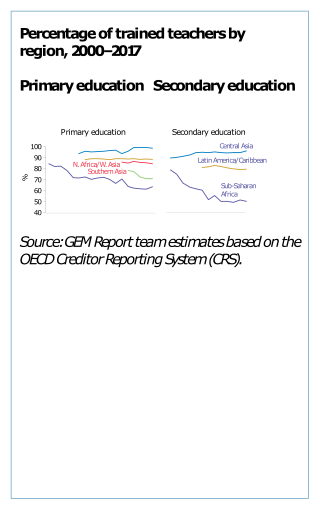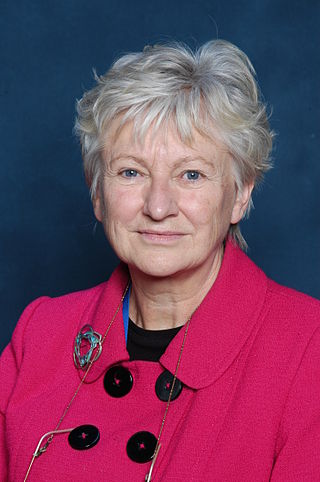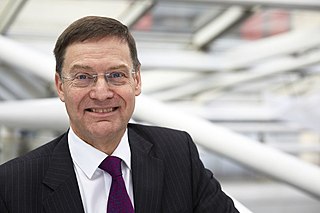The following outline is provided as an overview of and topical guide to education:

In education, a curriculum is broadly defined as the totality of student experiences that occur in the educational process. The term often refers specifically to a planned sequence of instruction, or to a view of the student's experiences in terms of the educator's or school's instructional goals. A curriculum may incorporate the planned interaction of pupils with instructional content, materials, resources, and processes for evaluating the attainment of educational objectives. Curricula are split into several categories: the explicit, the implicit, the excluded, and the extracurricular.
A hidden curriculum is a set of lessons "which are learned but not openly intended" to be taught in school such as the norms, values, and beliefs conveyed in both the classroom and social environment.

Student voice is the individual and collective perspective and actions of students within the context of learning and education. It is identified in schools as both a metaphorical practice and as a pragmatic concern. Tech educator Dennis Harper noted that student voice gives students "the ability to influence learning to include policies, programs, contexts and principles."
Professor Edward Conrad Wragg known as Ted Wragg, was a British educationalist and academic known for his advocacy of the cause of education and opposition to political interference in the field. He was Professor of Education at the University of Exeter from 1978 to 2003, serving as Emeritus Professor of Education from 2003 till his death, and a regular columnist in the Times Educational Supplement and The Guardian
Patricia M. Broadfoot, CBE, FRSA, FAcSS was vice-chancellor of the University of Gloucestershire from 2006 to 2010. She served as Pro Vice-Chancellor of the University of Bristol from 2002 to 2006.

Teacher education or teacher training refers to programs, policies, procedures, and provision designed to equip (prospective) teachers with the knowledge, attitudes, behaviors, approaches, methodologies and skills they require to perform their tasks effectively in the classroom, school, and wider community. The professionals who engage in training the prospective teachers are called teacher educators.

The sociology of education is the study of how public institutions and individual experiences affect education and its outcomes. It is mostly concerned with the public schooling systems of modern industrial societies, including the expansion of higher, further, adult, and continuing education.

The Teaching and Learning Research Programme (TLRP) was the United Kingdom's largest investment in education research. It was initiated in 2000, ended in 2011 and was managed on behalf of the Higher Education Funding Councils by the Economic and Social Research Council. The programme engaged 700 researchers in some 70 major projects. These covered all education sectors - from Early Years to Higher Education and Workplace Learning. The TLRP researchers work closely in partnership with practitioners to ensure the relevance and application of findings to policy and practice. Thematic work across the diverse range of projects enabled analysis of themes and the identification of 'ten principles for effective teaching and learning'.
Mary James FAcSS retired in January 2014 as Professor and Associate Director of Research at the University of Cambridge, Faculty of Education. In the same year she completed her four-year term as Vice President and President of the British Education and Research Association.
Allan Luke is an educator, researcher, and theorist studying literacy, multiliteracies, applied linguistics, and educational sociology and policy. Luke has written or edited 17 books and more than 250 articles and book chapters. Luke, with Peter Freebody, originated the Four Resources Model of literacy in the 1990s. Part of the New London Group, he was coauthor of the "Pedagogy of Multiliteracies: Designing Social Futures" published in the Harvard Educational Review (1996). He is Emeritus Professor at Queensland University of Technology in Brisbane, Australia and Adjunct Professor at Werklund School of Education, University of Calgary, Canada.
Values education is the process by which people give moral values to each other. According to Powney et al. It can be an activity that can take place in any human organisation. During which people are assisted by others, who may be older, in a condition experienced to make explicit our ethics in order to assess the effectiveness of these values and associated behaviour for their own and others' long term well-being, and to reflect on and acquire other values and behaviour which they recognise as being more effective for long term well-being of self and others. There is a difference between literacy and education.
William Cope, known as Bill Cope, is an Australian academic, author and educational theorist who was a research professor in the Department of Educational Policy Studies at the University of Illinois, Urbana-Champaign, He has also been the Managing Director of Common Ground Publishing at the university.
Thomas S. Popkewitz is an Professor in the Department of Curriculum and Instruction, University of Wisconsin–Madison School of Education, USA. His studies explore historically and contemporary education as practices of making different kinds of people that distribute differences. He has written or edited approximately 40 books and 300 articles in journals and book chapters translated into 17 languages. Recent studies focus on the comparative reason of educational research as cartographies and architectures that produce phantasmagrams of societies, population and differences. The studies entail theoretical, discursive, ethnography, and historical studies that explore school, professional identities, and the relation to conceptions of differences inscribed childhood, learning and cultural differences.
Stephen A. C. Gorard is a British academic who specialises in the sociology of education. He is Professor of Education and Public Policy at Durham University. Stephen Gorard is the most published and cited UK author in education, and in the top ten academic journals worldwide.
Beverly Derewianka is Emeritus Professor of linguistics at the University of Wollongong, Australia. She is a leading figure in educational linguistics and Sydney School genre pedagogy. Her major research contributions have been in the field of literacy education. Her research projects tracing students’ literacy development have had a direct and substantial impact on curriculum and syllabus development in Australia and internationally. She has (co-)authored 11 books and numerous book chapters and journal articles in the field of literacy education.

Angela W. Little is Professor Emerita at the Institute of Education, University of London. She is known for her work in primary education policy and practice in developing countries as well as education planning, program evaluation and assessment. In particular she has focussed in seven main areas:

Professor Sir Chris Husbands is a British academic, educationist, university leader and public servant, who has been Vice-Chancellor of Sheffield Hallam University since January 2016.

Keith James Topping is a researcher in education. He designs intervention programs for teachers, parents and others to help children, then researches whether and how they work.
Frances Helen Christie, is Emeritus professor of language and literacy education at the University of Melbourne, and honorary professor of education at the University of Sydney. She specialises in the field of systemic functional linguistics (SFL) and has completed research in language and literacy education, writing development, pedagogic grammar, genre theory, and teaching English as a mother tongue and as a second language.







